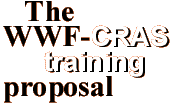|

The present planning system - as it has been outlined so
far - certainly responds to some needs, which are now obsolete,
of a social system based on industrial production, on big organizations
and big projects, on a kind of job policy addressed to beneficiary
sectors and groups. This planning system does not correspond
to one particular kind of society any longer, for in contemporary
society the production of intangible goods has replaced the production
of tangible goods. Moreover, in current society, development policies
are increasingly focused on single projects which create new
jobs, but not on large-scale policies. Multivalence took over
specializations, the number of people working in the service sector
increases, but not the number of people working in industries; relational
abilities must be integrated into - sometimes they replace - technical
qualification. The historical rigidity of the relation between
life time and working time is also changing. Therefore, today
an increasing continuity between home environment and working environment,
as well as a new time management and a conciliation
with the territory are being created. Substantially, there was a
passage from the industrial model to a new model (i.e. post-industrial
and post-modern civilization, information society, global village,
globalization, etc.). But, at the same time, not all social intervention
tools have been re-planned or re-designed.
The main focus of the ADAPT project is on the opportunities offered
by the enhancement of local contexts and in designing training actions
which are very much faithful to these contexts. The following points
are the basic points:
-
The usefulness of granting a privilege to local context
to promote sustainable development. In our opinion, the
basic feature of this idea is the effort done in planning development
strategies with new patterns, enhancing cultural contributions
from the populations involved and changing the elements of their
environmental context into useful resources. Adopting this
vision means promoting a kind of development which ought
to be endogenous, which can count on its own capabilities,
which starts from the logic of needs, which promotes the symbiosis
between man and nature and which remains open to
institutional changes.
- Local
development is considered the motor for the creation
of new jobs through the enlargement of innovatory productive
base, the enhancement of local resources and the creation
of new functions in the labour market.
The
analysis of local economical development in Europe shows the existence
of strong endogenous factors which explain the ability of
local systems to grow, with the same structural conditions. The
assumption behind this idea is that an area has some resources,
the economical enhancement of which can contribute to the creation
of new jobs. It seems that the tool represented by labour agreements
is becoming more and more a distinctive element of this process.
-
The variation in progress in the labour market and the
change of jobs are the main subjects involved in the idea of labour
flexibility. One of the interesting aspects for the creation
of new jobs consists of the promotion of new forms of labour market
flexibility: flexibility in the organization, salary, time and
working time (part-time, definite time, temporary work, differentiated
working times, etc.).
-
The features of the new job-creating sectors: the areas
where new jobs are created often coincide with the contexts where
the various forms of no-profit and service offer appear (third
sector).
-
The most recent debate about the flexibility of competencies
and role played by vocational training.
The continuous evolution in the organizations has led to a redefinition
of professional functions. Professional qualification is no longer
technical competency, but it takes many other aspects of social
and working life into account, such as relationship systems,
values, experiences and various kinds of knowledge. This is
flexibility of competencies, i.e. a set of abilities and types of
knowledge enabling to deeply understand changes in progress,
more than giving stereotype answers. Competencies involve various
aspects of different kinds, from the capability to face complex
problems, to the ability to evaluate, choose and act even
in some fields which are close to one’s own field of competency,
up to the ability to establish relationships with other people.
For all these reasons, the knowledge needed for competency is not
limited to scholastic or academic knowledge. While in the past professional
qualification was based on a theoretical approach founded on the
analysis of tasks, today it is necessary to prepare people
for specific activities, providing them with capabilities
which should be able to evolve in the time and change
according to the context. At this point, the traditional approach
towards vocational training, meant at building up profiles defined
once and for all, certainly appears very limited. On the
contrary, it seems that today competency needs a set of general
knowledge including several fields of knowledge; moreover, it seems
that competency is a training object recurring in working context
and in other contexts (continuous training).
Note
1 (institutional changes)
See Sachs, I nuovi campi della pianificazione, Edizioni Lavoro,
Roma, 1984.
Back
|



|


